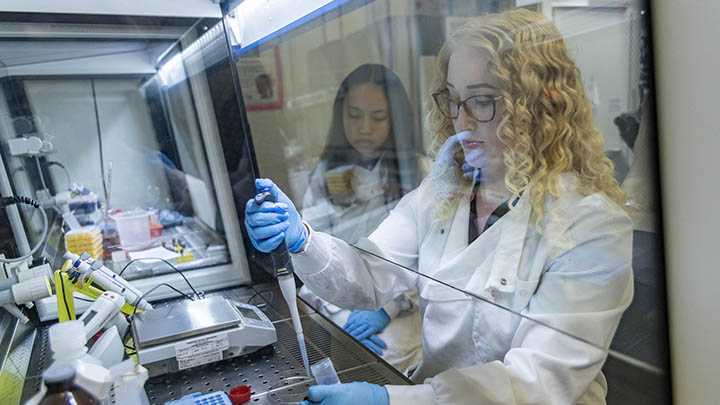Ready to learn more about the world of postgraduate research?
Discover whether postgraduate research is for you, find out what it involves, how it differs from undergraduate and postgraduate taught degrees, and why it might be your perfect next step.
What is postgraduate research?
Postgraduate research
Postgraduate research is an advanced level of study aimed at producing original knowledge in a specific subject area. It encompasses a number of different types of research degree including PhDs (Doctor of Philosophy), MPhils and professional doctorates such as DForenPsy.

Research projects
Rather than applying for and studying a specific postgraduate research degree, in the Faculty of Biology, Medicine and Health you'll generally apply for a specific research project and dedicate your time to researching that topic over three or four years. You'll aim to make an original contribution to the field while developing transferable skills for future careers within and beyond research and academia.

Key features of postgraduate research
Learn more about what defines postgraduate research and what you can expect.
Typically, postgraduate research projects and programmes last three to four years full-time or six to eight years part-time.
While undergraduate and taught postgraduate degrees involve structured courses and modules, postgraduate research focuses on a single research project in a specific area of biology, medicine and health.
Unlike taught degrees - which involve regular classes, lectures and assessments - postgraduate research is self-directed, with few formal classes and time spent independently researching, studying and working with your research group.
Working hours will vary depending on your preference, research project, research group and supervisor, but they will typically be similar to a normal working day, Monday to Friday, 9am to 5pm.
You'll need to find and apply for a specific project or programme in your area of interest. This is in contrast to other higher education courses, where you will be searching for a specific degree or course you want to apply for.
When you successfully finish your postgraduate research programme and graduate you're awarded a postgraduate research degree which is linked to your project.
The goal of postgraduate research is to produce new knowledge through original research. This means you’ll be discovering something brand new, whether it's a novel finding, theory, or application.
This is different to undergraduate and postgraduate taught degrees, where you are primarily studying research and work others have completed.
You'll work closely with a supervisor, who is an expert in your area of interest and will lead a larger research group.
They will guide and support you throughout your research journey and will have an active interest in the outcome of your research. You'll also need to contact the listed supervisor before you apply for a project or programme.
The goal of postgraduate research is to produce a final thesis contributing original research to the wider body of knowledge in your field, and to publish your findings in academic journals.
Is postgraduate research for you?
Dedicate yourself to research you're passionate about.
Conducting original research will not only benefit you and your career, but may also make a real-world difference in the fields of biology, medicine and health.
However, it isn’t for everyone. It’s important that, before you spend the time applying and you commit to starting, you’re certain it’s right for you.

Is postgraduate research for you?
Watch our webinar and discover what postgraduate research is and whether you're suited to a PhD in the Faculty of Biology, Medicine and Health at The University of Manchester.
The perfect next step for you if...
Our postgraduate researchers
Navigating the application process
Hear about current postgraduate researcher Holly's experience applying for a PhD and her top tips for making your application successful.

How I decided to pursue a PhD
Find out why current postgraduate researcher Katie decided to pursue a PhD and why you might want to consider one.

Ready to start your journey?
Before you apply
Before you start your postgraduate research application, you'll need to know some key details about your planned application and have several important documents ready.
Navigate the process by following our step-by-step list.






